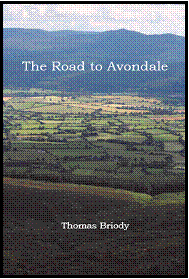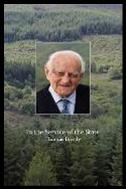|
Choice Publishing Book Store |
|
About the Author:
At the age of 96, Thomas (Tosty) Briody is one of the oldest foresters in Ireland. To date he is the only Irish forester to write an extensive account of his career in Forestry. Retiring in 1978, some ten years before Coillte was established, Thomas Briody is not just a witness to a vanished age in Irish Forestry, but also a witness to a number of vanished worlds. In this book, the first volume of his memoirs, he describes the Cavan of his youth and early manhood: the traditional way of life he witnessed passing as well as the harsh years of the Economic War, which he spent at home. He tells of his studies in Ballyhaise Agricultural College and Albert Horticultural College, Glasnevin and how he came to choose Forestry as a career. His subsequent training as a forester both at Avondale Forestry School and at various centres around the country is described in detail as are the initial few years he spent as a forester working on the Emergency Fuel Scheme that sought to keep trains running and hospitals heated during the Second World War. This book finishes in Spring 1943, some months before his marriage, when he was suddenly transferred from Slievenamon to the Slieve Blooms.
About the Book:
Born in Mullahoran, south-west Cavan, on October 28, 1913, less than a year before the outbreak of the Great War, my father’s earliest memories relate to that war and to the political upheavals that followed in the wake of the 1916 Rising. He started school when Southern Ireland was still administered from Dublin Castle, and he witnessed the War of Independence and the setting up of the Irish Free State. Like many of the generation that came of age in the first decade or so of independent Ireland he was imbued with idealism. In time he was to devote his life to the re-afforestation of Ireland, and make many personal sacrifices for that ideal. Although later in his life there were years when circumstances kept him away, and far away, from to his beloved Mullahoran and Cavan, he always carried the memories of his native place around with him in his head, and often when in a tight spot he would murmur to himself ‘Mullahoran!’ as a form of exhortation. It is no surprise therefore that in the first volume of his memoirs, his native parish, as well as the surrounding area, feature prominently. The Cavan of his youth made him, to a large extent, what he is, as did the years of the Economic War when times were hard not just for cash-strapped farmers but for the young in general. His experience at home in Cavan during that war helped steel him for the hard life that lay ahead. When he finally left home in Autumn 1936 on a path that was to lead him within a year or so to Forestry, he could hardly have imagined that he would not only be blessed with long life, but that he would survive all the Avondale Forestry class of 1937-40 and one day in his nineties set pen to paper to tell his story and much of theirs as well. My father first began writing an account of the world of his youth when he was in his late eighties in Autumn 1999. For a year or more he continued writing down his recollections of his childhood, up until his confirmation at age twelve. He may have had the intention of writing more at this juncture, but it is not entirely clear if he contemplated writing about his adult life. Much of these early writings consist of journeys down memory lane along the roads of his childhood, in the magical drumlin country of Mullahoran and Ballymachugh. Some of these early recollections about aspects of traditional life (amounting to some two hundred pages of foolscap) have been incorporated into this book, but many have not. It is hoped to publish them separately at some stage as they constitute a unit in themselves. The bulk of my fathers memoirs proper, some thousand pages of foolscap, were written from Spring 2005 onwards, after he had reached the age of 92. In the meantime, fearing that he would never get down to writing about the rest of his long life, in July 2001, I began recording on mini-disc his recollections of Forestry and his circuitous path to Forestry, as well as memories of his youth, early manhood and the traditional way of life he was witness to. The bulk of these recordings were made between July 2001 and January 2005, and amount to more than forty hours in all. There are also some hours of video-recordings of him reminiscing on aspects of his life. This is not all. There are in addition hundreds of pages of notes he has dictated to me over the years as well as extensive field-diary entries of mine for all his recordings. Among other things these diary entries contain much extra detail such as comments by him on his recordings, as well as additions and corrections. Subsequent to each recording session, he would diligently listen to what he had recorded. I have also kept extensive notes of numerous conversations we have had on his childhood, his career in Forestry, and other matters. My father has not just documented and recorded much of his life, he is also a very well-documented man. He once said to me that he is a guinea pig, and in a sense he is. I believe the extensive recordings we made together over a period of almost four years helped him to focus on his life and structure it when he later came to write about it. Once he began writing his memoirs proper, he would record no more. Even though he had enjoyed immensely our recording sessions, he seemed to value the written more than the spoken word. Be that as it may, he had by this stage set himself the task of writing about his years in Forestry and nothing was going to distract him from that goal. He began his account in Spring 1943, just prior to his marriage, with an incident that almost ended his life, when one evening he went astray and became disorientated on the Slieve Bloom Mountains. His going astray on the Slieve Blooms is something he had refused to record for me, saying he could only do justice to it in writing. The process of describing the events of that long, terrifying night on the mountainside, would appear to have inspired him to write about what ensued when he came down off the mountain the following morning. Given up for dead by the people down below, he was to go on and marry that Summer and start a family and work the area as forester for the next three years, before being transferred to Mount Bellow, Co. Galway in 1946. There were to be two other transfers after that before he was eventually transferred to the Carrick-on-Suir area in 1960, where he was to remain until he retired in 1978. Before he could go ahead, however, and write about his subsequent career in Forestry, he had to go back, and dealt somewhat briefly with his path to Forestry via Ballyhaise Agricultural College and Albert College, Glasnevin, as well as with his training in Avondale Forestry School and his early years as a forester. This left a gap in his writings between his Confirmation in 1925 and his going to Ballyhaise Agricultural College in 1936. He then went back diligently and filled this gap. In addition, realising that his treatment of his path to Forestry and his training as a forester had been somewhat a rushed job, he rewrote the section of his memoirs dealing with the period 1936-1943. At this stage we had the makings of two books: one on his life up until 1943 and the other on his career as forester from 1943 to 1978. When I pointed out to him, however, that his earlier writings on his childhood would not constitute a suitable introduction for the first book, he wrote a lengthy new section on his childhood. He also rewrote and expanded a number of other sections for this first volume of his memoirs. Thus, my father’s memoirs have a somewhat convoluted history. They have also a deeper dimension because of the existence of a substantial corpus of related recordings and notes. In editing this first volume of his memoirs, it has been necessary to reorder sections of his text somewhat. This has sometimes involved the addition of a sentence or two, but any substantive changes to the text have been vetted by him. Not only has he read and commented on each section as it was edited, he has also read the final complete text twice. No mean achievement for a man of almost 96 years of age, not to mention his great achievement in writing such a lengthy document in the first place! A few short extracts from his recordings have silently been included in this volume, but the bulk of these recordings have been left for another day. There is much on the mini-disc recordings that are not in his writings and much in his writings that are not in his recordings. They complement each other, and at times contradict each other, and this is as it should be. Memory is not a simply matter of recall. People view the past through the lense of the present and there is much in my father’s writings and recordings that are influenced by more recent events, and indeed by his day-to-day life, as well as by his personality, which is very positive. This corpus of texts, notes and recordings constitute a veritable goldmine for the study of memory. Hopefully, in time to come it will be availed of by scholars, but for the present here is the first volume of his story as he tells it.
|

|
The Road to Avondale
By
Thomas Briody
ISBN: 978-1-907107-25-2
Price: €19.99 |

